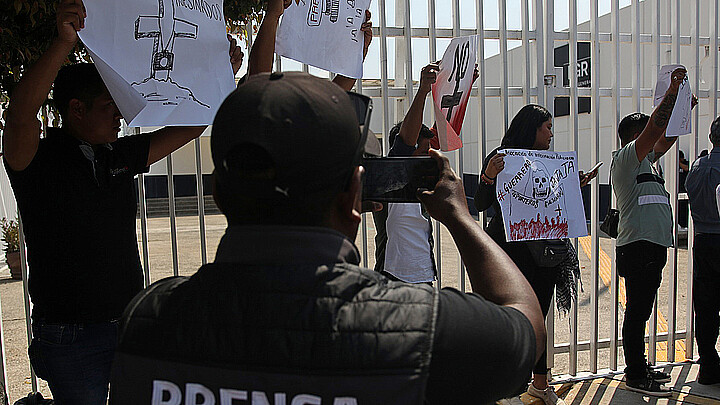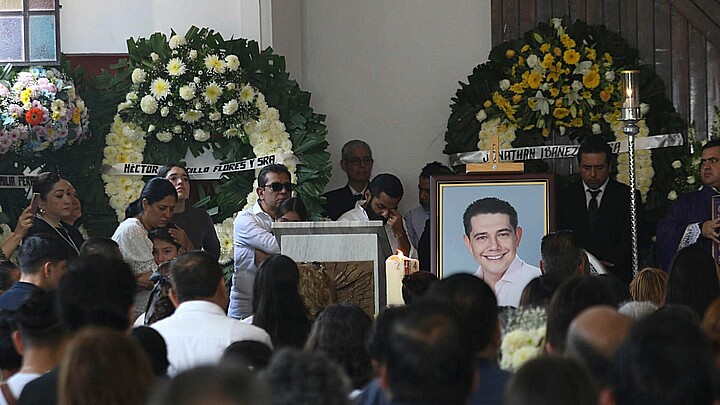Crime
Los Zetas cartel chief faces up to 700 years in Mexican prison after serving 17 years in U.S.
Osiel Cárdenas Guillén was released from an Idaho based federal prison on Monday and turned over to Mexican law enforcement officials at the border

December 18, 2024 7:36am
Updated: December 18, 2024 7:36am
A Los Zetas cartel chief faces up to 700 years of prison time in Mexico after having been deported to his home country fin the wake of a lengthy prison sentence in the United States.
Osiel Cárdenas Guillén, 57, was released from an Idaho based federal penitentiary institution, FCI Terre Haute, in August. FCI correction authorities turned the cartel chief over to U.S. Immigration and Customs Enforcement, which orchestrated his deportation and sent him back to Mexico on Monday.
Cárdenas became a recognized figure in the Gulf drugs cartel during the 1990s.
He boldly recruited agents of Mexico’s elite special forces to use them as Gulf cartel enforcers assassins and even eliminated his own allies in an attempt to become the cartel’s leader.
The law enforcers-turned-cartel assassins became known throughout the embattled North American country as Los Zetas.
Some of the men he recruited as cartel killers committed acts of brutality by decapitating and dismembering their victims, which created a wave of fear through the cartel’s turf in north-eastern Mexico.
Cárdenas’ merciless tactics soon earned him the nickname of “Mata Amigos" (Spanish for "killer of friends"), and by the early 2000s, the cartel leader was one of the most wanted men in Mexico.
A recent headline in the Spanish newspaper El País named him “the first drug cartel capitalist.”
“He reigned for only a few years, but he changed everything,” the newspaper reported. “This could be the epitaph on the criminal tombstone of Osiel Cárdenas Guillén, the first drug cartel capitalist. At the turn of the century, Cárdenas, now 57, was the architect of the massive expansion of the Gulf Cartel — the name the United States used for the drug trafficking group from Tamaulipas, in northeastern Mexico.
The paper further said that Cárdenas was a “bridge between two worlds” and that he rose within the Tamaulipas drug trafficking networks during the late 1980s and into the 1990s.
“This period also marked the signing of the North American Free Trade Agreement (NAFTA), an event that would forever alter North America, as well as drug trafficking and the broader criminal economy,” the paper reported. “The surge in economic activity and cross-border traffic between the United States and Mexico opened numerous opportunities for the Gulf Cartel, with Nuevo Laredo serving as its main departure point, due to its strategic connection with Monterrey and Guadalajara.
Cárdenas was in charge of the Los Zetas cartel until 2003 when he was captured by Mexican soldiers near in his home state of Tamaulipas near his hometown of Matamoros.
At that time, the Los Zetas was recognized as of the most violent organized crime enterprises in Mexico, and the cartel chief was reportedly detained only after a vicious gunfight.
Knowing how much power and influence Cárdenas harbored in Tamaulipas, the Mexican government immediately relocated him to Mexico City, where he was locked behind bars as part of a pre-trial detention order.
Four years later, in 2007, the feared cartel leader was extradited to the U.S. where the Justice Department charged him with trafficking tons of cocaine into the United States and threatening to murder federal agents.
He pleaded guilty in 2010 and was sentenced to 25 years in a U.S. federal prison.
Cárdenas’ early release from the U.S. after 17 years of incarceration does not mean he immune from prosecution in his Mexican homeland.
When Cárdenas was turned over to Mexico at the Otay border crossing on Monday, he was re-arrested by Mexican law enforcement agents and transported to Federal Social Readaptation Center No. 1, also known as the El Altiplano maximum security prison.
Mexican prosecutors have said that during his reign, the former cartel leader was as one of the most powerful drug lords in the country.
He is now facing seven open federal cases involving murder and organized crime, and that he could be sentenced to more than 700 years in prison if convicted on all charges.
According to El País, Cárdenas “led one of the first major criminal wars of contemporary North America, waging battle against the Sinaloa Cartel and its allies for control of Nuevo Laredo, a key border hub between Mexico and the United States.”










